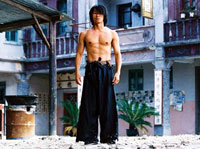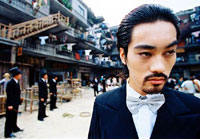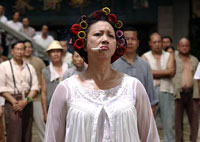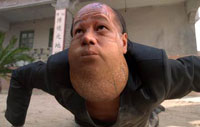Interest in Eastern cinema has been on the rise ever since the popularity of Jackie Chan in the ’90s. The unconventional martial arts magic of 1999’s The Matrix played its part in rekindling interest, contributing to the success of Ang Lee’s 2000 masterpiece Crouching Tiger, Hidden Dragon. In recent years, critics and art house audiences have come away enthralled with the stunning visuals of both Hero and House of Flying Daggers, both from acclaimed Chinese director Yimou Zhang.
But whereas most of those films relied heavily on drama, romance, and epic scopes, Kung Fu Hustle fuses the kung fu action film with an altogether different genre: comedy. Even the film’s original 2004 Hong Kong title, Gong Fu, sounds funny. However, Kung Fu Hustle doesn’t really take the parody approach that you might expect. Rather, it pays admirable tribute to the genre while weaving comedy into it and telling a story.
Stephen Chow: Remember that name, because his fame will only increase for years to come. The 41-year-old actor and director is Hong Kong’s No. 1 comedy star, credited for starting the Mo Lei Tau (“Nonsesne”) comedy style of Chinese cinema. He’s starred in more than 50 films, and directed 7 of his own. The critically acclaimed Shaolin Soccer (2001) was his first international success. A silly and spirited combo of loveable loser sports films and kung fu action, rent this one if you want a foretaste of Chow’s unique style.

Kung Fu Hustle is set in pre-revolutionary China during the 1930s—a world that is in some ways surprisingly similar to Depression-era America. Organized crime rules the streets, with no gang more notorious than the Axe Gangsters, led by the ruthless Brother Sum. They wear black suits, they sport top hats, they even dance a little bit, and yes, they do carry axes.
They’re also focused on extorting the rich, so life in the impoverished Pig Sty Alley is relatively safe. The residents there live the simple life of tradesmen, happy to do what they love. Among them are muscleman Coolie, baker Doughnut (mmm … doughnut), and a rather swishy Tailor. In a scene reminiscent of the flashback sequence from The Godfather II, the neighborhood Landlord cheerfully stops by every shop and residence for rent and services. He is, however, (seemingly) a bit of a cartoonish buffoon. His wife the Landlady is really the one who wears the pants in this relationship, overseeing the neighborhood with a (seemingly) harsh and unsympathetic fist.
Trouble quickly brews when street hustler Sing (Chow) and his chunky sidekick show up trying to swindle townspeople out of money by posing as members of the Axe Gang. Naturally, the real gang members find out and attempt to unleash havoc on Pig Sty Alley, only to uncover some kung fu masters among the residents willing to protect their neighbors. As Brother Sum plots revenge, he makes an offer to the street-smart Sing—he can become a legitimate member of the Axe Gang if he simply kills someone.

Sing decides to take out the Landlady since she publicly humiliated him earlier. Shouldn’t be a problem since he’s supposedly studied kung fu—”The Buddhist Palm Kung Fu Technique” anyway, a “2 cent Kung Fu manual” sold to naïve children on the street like a comic book or a pair of X-ray specs. From there the film continues to take unexpected twists—both exciting and comedic—as the tales of vengeance and honor unfold.
Like he did in Shaolin Soccer, Chow blends CGI effects with beautifully choreographed fight scenes that employ wirework and other clever stunt techniques. The action is smooth and smartly done, featuring choreography by the great Woo-ping Yuen (The Matrix, Kill Bill). A cinematic highlight features heroes battling two musicians who can produce sonic swords and blasts from simply strumming their stringed instrument.
Kung Fu Hustle distinguishes itself as a film that combines all of this for comedic effect. One of the best scenes has Sing trying to throw knives at someone and failing miserably with humorously slapstick results. Most of the time, people take blows to the face as if they were made of rubber. You can tell early on that the film isn’t all that serious when a guy falls out of a third story window, lands on his face, takes a flower pot to the head, and lives.

Unfortunately, the CGI effects are cheaply done. Sometimes that can be overlooked because it’s showcasing something inventive that serves the spirit of the picture—especially when it’s played for laughs, looking like a bad Saturday morning cereal commercial. The worst effect, however, are the times when characters use super speed powers. Chow is probably trying to pay tribute to the old Chuck Jones Road Runner toons in these scenes—or else Benny Hill—but it simply looks too cartoonish and ridiculous to appreciate.
Chow’s comedic sensibilities, however, are a pleasant surprise. Eastern humor often doesn’t translate well with Western audiences, but this talented director was clearly raised on films from both cultures. Not only does he make reference to classic Bruce Lee movies and other kung fu greats, but also memorable scenes and lines of dialogue from The Untouchables, Spider-Man, and The Shining. Look for a quick visual tribute to Fred Astaire and Ginger Rogers in front of a movie poster. As dark as this humor could be, it plays out more like the classic comedy stylings of The Three Stooges or Abbot and Costello.
It’s also Chow who shows the strongest comedic acting on screen. Nearly all of the other actors play the humor straight as if they really were in a kung fu movie, but leading man Sing feels like he’s in a comedy featuring Charlie Chaplin, Bob Hope, or Billy Crystal. But other classic actors are up for the fun by playing against type. Yuen Wah often plays the bad guy in Hong King films, but most of his screen time as the Landlord is played as a fool. An action star in Hong Kong films decades ago, Yuen Qiu gained weight and an attitude to play the Landlady. And the film’s ultimate villain—simply called The Beast—is played by Leung Siu Lang, a kung fu legend (almost as famous as Bruce Lee and Jackie Chan) from the ’70s and ’80s, who has traditionally played the good guy.

Yet while all of this could have been played for parody and action film clichés, there’s actually a decent story driving things along. Though the plot is ultimately rather predictable, the execution is not—nothing is ever quite as it seems. There’s also some heart and serious action amid all the chuckles and hilarity. Chow and his team excel at quickly establishing characters without using names, relying mostly on simple traits and quirks.
If Kung Fu Hustle feels a little longer than its 99 minutes, perhaps it’s because it’s a series of humorous and impressive kung fu scenes strung together. But it’s not repetitive either, and there’s also no denying that this film is a unique amalgamation of styles. Not everyone will appreciate it, but it’s more accessible than expected—you don’t have to be a kung fu aficionado to appreciate it, though it undoubtedly helps. A strange, fun flick that loves its source material dearly, Kung Fu Hustle is destined to become a cult classic.
Talk About It
Discussion starters- The people of Pig Sty Alley find peace in their poverty and their willingness to ignore injustice. Elsewhere a boy is humiliated for standing up for another. And in another scene, heroes endanger their future by doing the right thing. Is it appropriate to play it safe for security? Or are we called to do good by stepping outside of our comfort zones? How much should we be willing to sacrifice to help others—realistically and according to the Bible?
- One of the film’s characters calls being ordinary “a blessing.” Is conformity encouraged or discouraged according to Christian beliefs? What good comes from being different? Is there an advantage to being ordinary?
- If we’re all blessed with special talents and abilities, how do we discover them and live to our full potential? Contrast Sing’s original plan for greatness with the actions that led to the fulfillment of his destiny.
The Family Corner
For parents to considerThough rated R for its strong stylized action and violence, most of Kung Fu Hustle relies on typical martial arts action—plentiful and choreographed, but more comical than bloody. The murder of a crime boss and his mistress in the opening sequence is somewhat intense, and there’s a decapitation shown in silhouette later in the film. The violence is really closer to a PG-13 rating, but there are other things for families to consider. Bullies urinate on a boy to shame him, one character displays flamboyantly gay tendencies, and there’s some Buddhist symbolism. And interestingly, though the MPAA says doesn’t mention bad language in its reasons for the rating, there’s some R-rated profanity—granted, it’s in Cantonese/Mandarin, but it’s right there in the English subtitles.
Photos © Copyright Sony Pictures Classics
What Other Critics Are Saying
compiled by Jeffrey Overstreetfrom Film Forum, 04/28/05The funniest film of the year so far may also be the most violent.
Both a martial arts spectacle and a zany laugh-fest, Stephen Chow’s Kung Fu Hustle is an outrageous spoof of kung fu movies that has fans of the genre in hysterics. The movie is about a petty crook (Chow) who dreams of becoming a gangster. As he tries to make his dreams come true, he finds himself careening between musical numbers, Looney Tunes action sequences, and over-the-top frenzies of hyperviolence.
“Take Crouching Tiger, Hidden Dragon and The Matrix and mix in the manic whiz-bang zaniness of the classic Looney Tunes cartoons and you’ll get the picture,” says David DiCerto (Catholic News Service). “Much like Jackie Chan, Chow possesses an appealing blend of charm, athleticism and disarming humor. The violence—of which there is quite a lot—is intentionally over the top … [and] somewhat tempered by the film’s tongue-in-cheek campiness.”
Tom Neven (Plugged In) asks, “So how much cartoonish violence is too much? In an attempt to spoof over-the-top (and wildly fake) movie violence, can a filmmaker go too far, and ultimately produce something worse than the original? Maybe Chow is attempting to answer those questions while taking us on a supremely weird and wild ride. Then again, maybe he’s just getting his kicks at our expense.”
Mainstream critics are hooting and hollering. In a good way.












